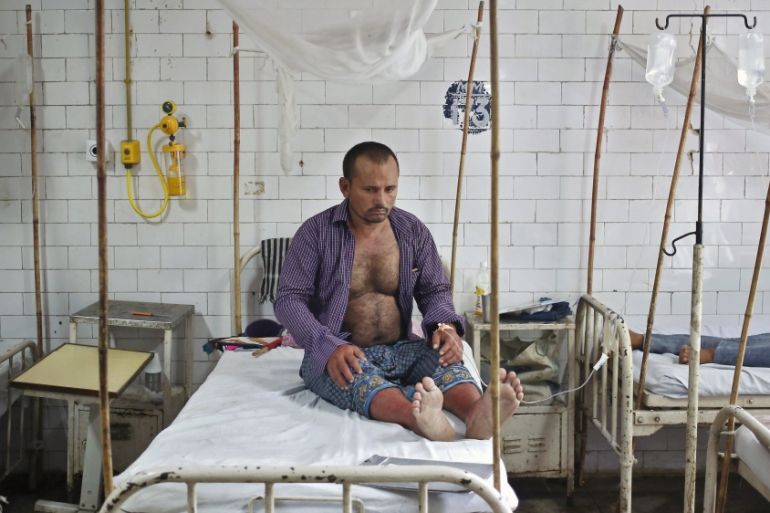First dengue vaccine cleared for use in Mexico
Health authorities accept vaccine against virus that kills about 22,000 people every year across the world.

Mexican health authorities have approved the first vaccine to gain official acceptance for use against the dengue virus, which infects an estimated 390 million people every year, mostly in Asia, Africa and Latin America.
The federal medical safety agency said on Wednesday that the vaccine has undergone testing on over 29,000 patients worldwide.
Keep reading
list of 4 itemsDeadly Sahel heatwave caused by ‘human-induced’ climate change: Study
Woman, seeking loan, wheels corpse into Brazilian bank
UK set to ban tobacco sales for a ‘smoke-free’ generation. Will it work?
The agency did not name the drug but the France-based Sanofi Pasteur identified the vaccine as Dengvaxia.
Mexico said the vaccine is aimed at people aged 9 to 45 and will be used in areas where the disease is endemic.
|
|
According to a World Health Organization (WHO) report published in late 2014, the vaccine had an average rate of effectiveness of about 60.8 percent in protecting against the four strains of dengue currently circulating.
Sanofi said its vaccine was shown to “reduce dengue due to all four serotypes [strains] in two-thirds of the participants”, a figure similar to the 65.6 percent rate reported in a study published in September by the New England Journal of Medicine.
That is relatively low for a vaccine. Common vaccines like those for measles and polio are more than 95 percent effective.
But Dengvaxia appeared to be particularly effective in protecting people from the most extreme, potentially life-threatening form of the disease, known as dengue haemorrhagic fever, which can cause internal bleeding, shock, organ failure and death.
Sanofi said in its statement that the drug “prevented 9 out of 10 cases of severe dengue and 8 out 10 hospitalisations due to dengue”.
Cameron Simmons, a professor of microbiology and immunology at the University of Melbourne, told Al Jazeera that the vaccine must be widely used in order to significantly curb the number of Dengue cases, but noted that it will not fully eradicate the virus.
“The evidence from the vaccine trials is that it can prevent hospitalisation for about 80 percent of those who get vaccinated,” he said.
“It would need to be very widely used in order to result in a major reduction in the prevalence of Dengue.”
Fast-growing disease
Globally, dengue is the fastest-growing mosquito-borne disease. The deadliest form of the disease kills 22,000 people per year, according to WHO.
The vast majority, about 80 percent, of people infected with dengue virus are asymptomatic or have only mild symptoms such as an uncomplicated fever.
|
|
About five percent of infections cause more severe illness, and less are life-threatening.
Dr Cuauhtemoc Ruiz, chief of Pan American Health Organizations’ immunisation programme, said whether the vaccine will be widely used will depend on a cost-benefit analysis.
Countries will have to weigh whether another treatment or simply spraying to reduce mosquitoes would prevent more illnesses and deaths for the same money.
Ruiz said at least five other dengue vaccines are in clinical development.
Mexico’s federal medical safety agency, known by its initials as Cofepris, said the vaccine could help prevent 104 deaths and 8,000 hospital admissions and save about $65m in health expenditures annually.
Sanofi did not say how much the vaccine will cost. In tests, it was administered in three doses spaced out over a year, and WHO’s report said it was unclear how long it would protect those who received it.